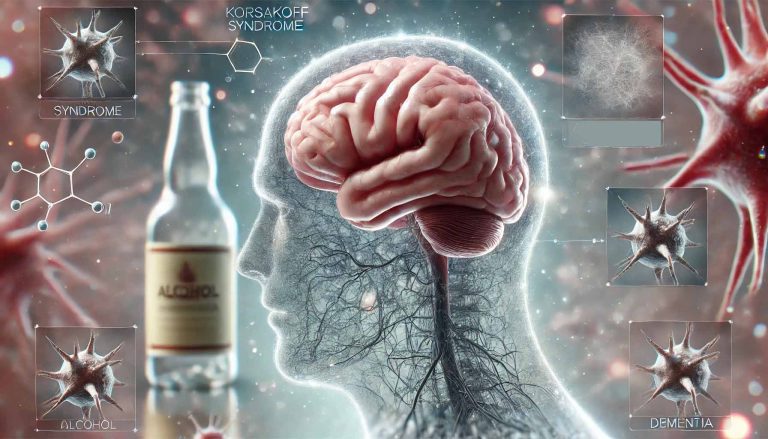An Incomplete Guide
What is Korsakoff Syndrome (KS)? The Alcohol-Related Dementia

Korsakoff Syndrome is a severe memory disorder caused by long-term thiamine (vitamin B1) deficiency, most commonly associated with chronic alcohol abuse. Unlike other dementias that affect overall cognition, Korsakoff Syndrome primarily impacts short-term memory and the ability to form new memories, while other mental functions remain relatively intact.
Often considered part of Wernicke-Korsakoff Syndrome (WKS), this condition develops when Wernicke’s Encephalopathy (an acute neurological disorder) goes untreated, leading to permanent memory damage.
What is Huntington’s Disease Dementia (HDD)?
What Causes Korsakoff Syndrome?
The primary cause of Korsakoff Syndrome is severe and prolonged thiamine (vitamin B1) deficiency. Thiamine is essential for brain function, and without it, neurons struggle to produce energy, leading to cell damage.
Common Causes of Thiamine Deficiency:
- Chronic Alcoholism – Alcohol impairs thiamine absorption and storage.
- Severe Malnutrition – Common in individuals with eating disorders or long-term poor diets.
- Gastrointestinal Disorders – Conditions like Crohn’s disease or chronic vomiting can reduce thiamine levels.
- Certain Medical Treatments – Long-term dialysis or weight-loss surgeries can lead to deficiencies.
While alcoholism is the leading cause, Korsakoff Syndrome can also occur due to any condition that depletes thiamine.
Symptoms of Korsakoff Syndrome
The hallmark symptom of Korsakoff Syndrome is severe short-term memory loss, often accompanied by confabulation, where patients unintentionally fabricate information to fill in memory gaps.
Key Symptoms:
- Profound short-term memory loss (can’t remember recent events).
- Confabulation (unintended false memories to fill gaps).
- Difficulty learning new information (but old memories remain intact).
- Lack of insight into memory problems (patients are often unaware of their deficits).
- Disorientation and confusion (especially in later stages).
- Apathy and lack of motivation.
Unlike Alzheimer’s disease, reasoning, language, and personality often remain unaffected, making the disorder unique in its impact.
How is Korsakoff Syndrome Diagnosed?
Diagnosing Korsakoff Syndrome can be challenging because patients are often unaware of their own memory impairments.
Doctors typically use:
- Cognitive Tests – Assessing memory, problem-solving, and recall ability.
- Blood Tests – Checking thiamine levels and nutritional deficiencies.
- Brain Imaging (MRI, CT scans) – Detecting brain shrinkage, particularly in the mammillary bodies and thalamus, which are linked to memory processing.
Early diagnosis is crucial since prompt treatment can prevent further damage and, in some cases, improve symptoms.
Treatment and Management
Unlike many other types of dementia, Korsakoff Syndrome is preventable and, in some cases, reversible, especially if treated early.
Medical Treatment:
- Thiamine Replacement Therapy – High-dose vitamin B1 injections or supplements can halt further progression.
- Nutritional Support – Improving overall diet and hydration.
- Alcohol Cessation Programs – Stopping alcohol use is critical to prevent further brain damage.
Therapies and Rehabilitation:
- Memory Training – Cognitive exercises to strengthen recall.
- Structured Routines – Daily schedules help compensate for memory deficits.
- Psychological Support – Counseling to address apathy and motivation issues.
The earlier thiamine deficiency is treated, the better the chances of stabilizing symptoms and even regaining some memory function.
Prognosis and Life Expectancy
- With early treatment, some individuals regain partial memory function and stabilize.
- Without treatment, memory loss worsens, and long-term care may be required.
- If alcohol abuse continues, the condition progresses, often leading to severe disability or premature death.
Because Korsakoff Syndrome is caused by nutritional deficiency, it is one of the few dementia-related conditions that can be prevented and, in some cases, improved.
Wrapping Up
Korsakoff Syndrome is a preventable memory disorder caused by thiamine (vitamin B1) deficiency, most often linked to chronic alcoholism. Unlike Alzheimer’s, which affects multiple cognitive functions, Korsakoff primarily impairs short-term memory while leaving reasoning and personality intact.
Early intervention with thiamine therapy, proper nutrition, and alcohol cessation can prevent or even reverse symptoms, making awareness and early diagnosis essential.
- All Posts
- Dementia Guide
- Latest News
- The BAT Signal
- Versus
- All Posts
- Dementia Guide
- Latest News
- The BAT Signal
- Versus



